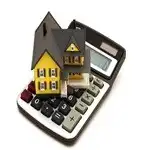
The ABSA house price index has shown a marginal decline in the value of small and medium houses and has revealed the property market could slow down even further.
The bank’s index for the first two months of the year said the general outlook in house prices in the South African residential sector had declined with the small- and medium-sized categories recording real price deflation.
It said, based on the outlook for nominal price growth and the headline consumer price inflation rate, real house price growth would slow down to about 5 percent this year.
Absa Home Loans property analyst Jacque du Toit attributed the decline to financial pressure on households, rising inflation, higher interest rates and low employment levels.
“Real price deflation accelerated in the small- and medium-sized categories up to January, with real price growth slowing down in the large segment,” Du Toit said.
“The latest trends in real house price growth came against the background of rising headline consumer price inflation, which increased from 4.8 percent year on year in November to 5.2 percent year on year in December and 6.2 percent year on year in January.”
In January, credit ratings agency Fitch Ratings said it did not expect real house price growth this year. Du Toit said nominal year-on-year growth in the average value of middlesegment homes remained steady around the 6 percent level in the first two months of 2016, but warned the growth would slow down to 5 percent in the remainder of this year.
He said the residential property market would continue to be driven by macro-economic trends and developments on household finances, which would experience increased financial strain this year.
Du Toit said real economic growth was forecast to slow down to only 0.9 percent this year from 1.3 percent last year, whereas the headline consumer price inflation rate was expected to average 6.4 percent, up from 4.6 percent last year.
“In view of mounting inflationary pressures, interest rates are forecast to increase by a further 75 basis points in the rest of the year, after being hiked by 50 basis points in January. This will bring the prime lending and variable mortgage interest rates, currently at 10.25 percent, to a level of 11 percent by the end of the year,” he said.
He said further interest rate hikes would harm the affordability of mortgage finance and dampen levels of activity and the performance of the housing market as well as the mortgage market. Property economist Erwin Rode said house price inflation could slow down to about 3 percent for the year as consumers continued to battle with high rates against high debt levels.
“All of these factors show that house price inflation will slow down. The question is by how much,” he said.
FNB household and property sector strategist John Loos said the country’s economic performance in the medium term would determine whether the real price deflation would turn into nominal deflation.
“Much depends on the economy. It depends on whether we are going to have a recession. Our view is that we are not going to have a recession. We will have a low positive economic growth. And if that is the case, we will avoid house price deflation. So I think we will have a single-digit house price inflation,” Loos said.
Article courtesy of Business Report
Author: Business Report

